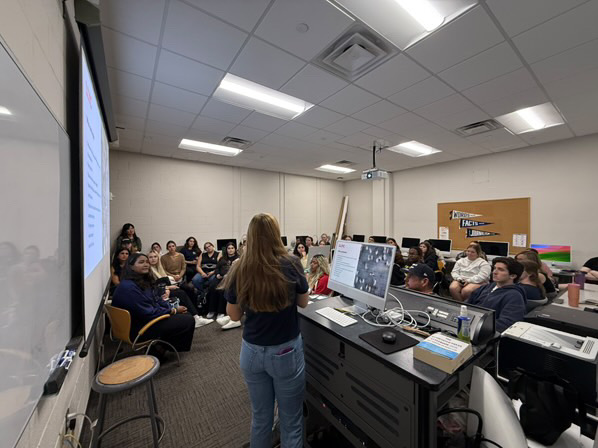On Monday, Sept. 29, in the Oakland Center Founders Ballroom, bestselling author Jess Walter read from his work, discussed the art of storytelling and answered audience questions. He brought a sense of humor and urgency to topics such as AI’s impact on society, the need for human connection and how to foster creativity in a changing world.
Walter’s books include standouts such as the No. 1 New York Times bestseller “Beautiful Ruins” and his award-winning novel “The Cold Millions.” He is known for his narrative range and ability to move seamlessly from political satire and historical fiction to emotionally resonant short stories. His latest novel, “So Far Gone,” has already been praised by The Washington Post as one of the “Books to Watch For” in 2025, showcasing his ability to balance adventure, social critique and deeply human characters.
During his reading, Walter reflected on his journey as a first-generation college student and young father from Spokane, Washington, to becoming one of America’s most celebrated writers. He recalled growing up in a working-class family with a father who never quite understood his chosen career.
“My dad would always remind me,” Walter said with a laugh, “They can read themselves.”
Walter said he has chased the dream of writing since his teenage years, when he discovered Kurt Vonnegut in his junior high library. Vonnegut was one of the first authors Walter interviewed as a student journalist, an encounter that solidified his commitment to storytelling.
Recently, Walter has turned his attention to technology, especially the growing influence of artificial intelligence. He recounted how several of his books were used without permission to train AI systems, part of a larger controversy fueling lawsuits by The Authors Guild. While Walter acknowledged the theft of creative work, he also voiced a deeper concern: what AI might mean for human thought, connection and creativity itself.
“AI makes you dumber,” he said bluntly, citing an MIT study that showed a sharp decline in cognitive engagement when students used generative AI to write essays. For Walter, the danger isn’t just plagiarism or misinformation but the way technology isolates people and rewires attention. “It’s a bad cigarette company,” he warned, urging students to consider how they can set boundaries around AI use.
Throughout the evening, Walter returned to a central theme: writing, like life, is less about certainty and more about exploration. From his early reporting on the Ruby Ridge incident, which became his nonfiction book Every Knee Shall Bow, to novels exploring love, comedy and loss, Walter has built a career on embracing complexity rather than reducing it.
As he told the audience, literature itself is a kind of database – one built not from stolen parts but from human voices layered across generations. His advice echoed the generosity shown to him by writers such as Vonnegut: ask questions, stay engaged and never stop trying to understand the unknown.
Walter reminded students that storytelling is not just about entertainment but about engagement with the world. Whether through satire, history or contemporary fiction, his works continue to challenge readers to see beyond their own experiences.
“Living in the question,” he said, “may be the truest work of both writers and readers.”






